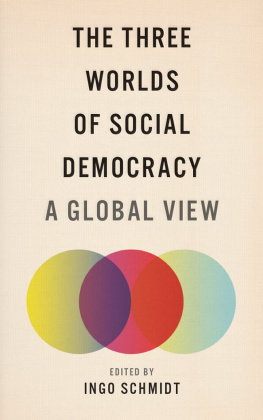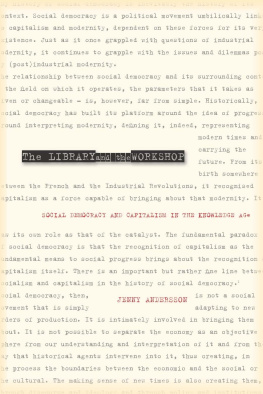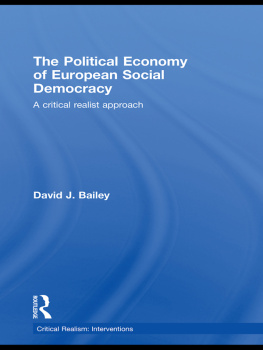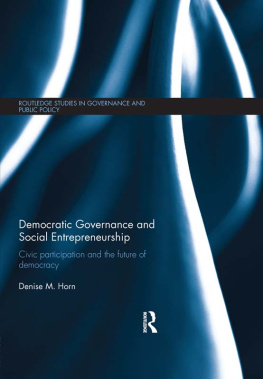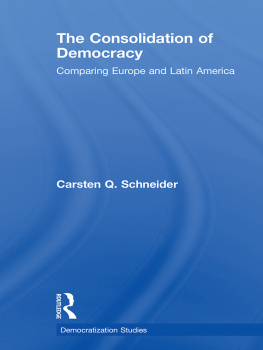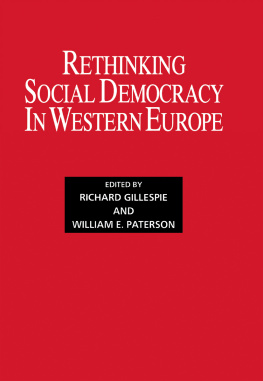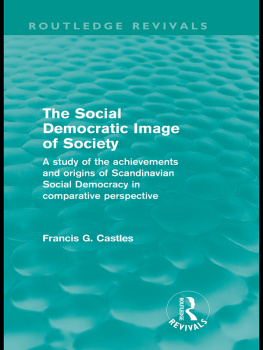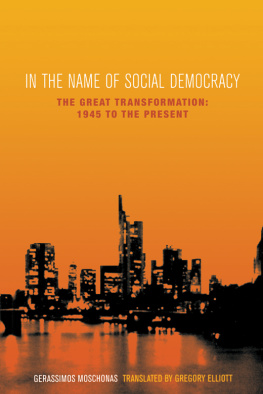First published 2016 by Pluto Press
345 Archway Road, London N6 5AA
www.plutobooks.com
Copyright Ingo Schmidt 2016
The right of the individual contributors to be identified as the authors of this work has been asserted by them in accordance with the Copyright, Designs and Patents Act 1988.
British Library Cataloguing in Publication Data
A catalogue record for this book is available from the British Library
ISBN 978 0 7453 3613 8 Hardback
ISBN 978 0 7453 3608 4 Paperback
ISBN 978 1 7837 1979 2 PDF eBook
ISBN 978 1 7837 1981 5 Kindle eBook
ISBN 978 1 7837 1980 8 EPUB eBook
This book is printed on paper suitable for recycling and made from fully managed and sustained forest sources. Logging, pulping and manufacturing processes are expected to conform to the environmental standards of the country of origin.
Typeset by Stanford DTP Services, Northampton, England
Simultaneously printed in the European Union and United States of America
Introduction: Social Democracy and Uneven Development Theoretical Reflections on the Three Worlds of Social Democracy
Ingo Schmidt
Social democracy is a paradoxical creature. With roots going back to the Age of Revolution from 1789 to 1848, it later established itself as an independent political force aiming to replace the dictatorship of capital by a socialist order in which workers would manage their own affairs in a democratic way. This was in the second half of nineteenth-century Europe. Soon social democrats argued over strategy, the big question being whether social reforms would lead to socialism in a piecemeal process or prepare workers for the revolutionary overthrow of capitalism. They were also torn between some who thought support of imperialism would help to gain reforms in the heartlands and others who considered imperialism as capitalisms twin that had to be opposed. During and after World War I (WWI), social democracys radical wing went its own, communist, ways, and its moderate wing settled for some kind of halfway house between capitalism and socialism (Abendroth, 1972; Eley, 2002). Somewhat unexpectedly, considering the economic and political turmoil from 1914 to 1945 that seemed to indicate capitalisms complete breakdown, social democratic goals were institutionalized in Western European welfare states during the post-WWII era (Hicks, 1999). Yet, it was in these heartlands that social democratic parties had tried to shake off commitments to the welfare state since the 1990s, a time commonly associated with neoliberal globalization and the end of the Cold War. Ironically, voters who were disappointed with the social insecurities and inequalities produced by neoliberalism repeatedly elected social democratic governments, hoping that they would offer at least some social protections. Balancing these expectations with corporate demands to lower taxes on profits and wealth and to relax all kinds of regulations is difficult enough when the economy is doing okay, but it becomes impossible in times of crises when faltering economies see government revenue plummeting and spending on unemployment benefits skyrocketing. This spectre of runaway deficits is big moneys lever to push for austerity. Submitting to finance capitals demands, many social democratic governments have sacrificed the expectations of their voters and their own re-election.
Pursuing the same or even more ruthless neoliberal policies, respective successor governments often then also fall out of favour, and so we see a return of social democrats to government offices. Such electoral cycles may save the survival of social democratic parties, but that doesnt mean that social democratic policies would be pursued at any time social democrats are in office. The social democratic idea of striking a compromise between capitalism and socialism is still popular, it seems, but todays social democrats seem incapable or unwilling to deliver an update of this kind of compromise that seemingly worked so well from the 1950s to the 1970s. During this Golden Age of capitalism, even conservative governments pursued social democratic policies without necessarily labelling them so. These days, social democrats pursue essentially neoliberal policies. For a while they misleadingly branded them as a Third Way, claiming equidistance to their previous commitment to the Keynesian welfare state and the neoliberalism of conservative parties (Fagerholm, 2013; Schmidt, 2012). More recently, most parties have given up any such labelling efforts. Sometimes they prescribe a lower dose of the neoliberal medicine than their conservative or other competitors, but sometimes they opt for bloodletting on a scale that their competitors preferred to avoid (Bailey et al., 2014; Escalona, Chapter 2, Kjeldstadli and Helle, Chapter 3, Crook, Chapter 4 in this volume).
Shaking off the very policies that voters are expecting from them isnt the only paradox of social democracy. Another is the social democratic turn that former communists in the East and radical movements in the South have taken since the 1990s even though, by that time, social democracys glory days in the West were already over. After the downfall of Soviet communism, the parties that had represented it in Eastern Europe had the choice to either follow the fallen economic and political system into the dustbin of history or reinvent themselves with new politics and ideas (Gowan, 1997). Social democracy was a readily available option for them. Notwithstanding bitter infighting that followed the split between social democrats and communists during WWI and later escalated into the Cold War, which saw the mainstream of social democracy aligning themselves with US-imperialism against their erstwhile comrades, they shared the same statist and productivist principles. The fact that communist ideas and actual policies were only loosely, if at all, connected also made it easy for communist parties to drop their old label and put up a new one. Pursuing social democratic policies was a different matter though. Eastern Europes newborn social democrats took the Third Way to neoliberalism even faster than their Western European counterparts. They left electorates behind that were fed up with old communists and disappointed by the new social democrats (De Waele et al., 2013, Part III: Central and Eastern Europe; Vachudova, 2013; Vesalon, Chapter 8 and Korsika, Chapter 9 in this volume).
In Western Europe, policies that built and expanded welfare states thrived after WWII because an exceptionally strong and long-lasting boom, along with the exploitation of the South, allowed complementary increases of profits and wages. Capitalists might have preferred to pocket these gains entirely for themselves but the very existence of Soviet communism convinced them that concessions to social democracy and their welfare state project were an advisable way to deepen the divisions between the two red flags (Childs, 2000). This turned out to be a successful move. When social democrats turned to the policies of detente in the 1960s they did this as representatives of welfare capitalism, calling it a more effective and democratic, maybe even more equal, alternative to the bureaucratic dictatorships in the East. Minorities within social democracy that sought realignment with the Soviets in order to open the way for a democratic socialism beyond both welfare capitalism and Soviet communism never gained enough ground to challenge the pro-capitalist and Atlanticist orientation of the social democratic mainstream.

